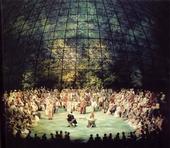Die Meistersinger von Nürnberg
From Wikipedia, the free encyclopediaDie Meistersinger von Nürnberg (The Mastersingers of Nuremberg) is an opera in three acts, written and composed by Richard Wagner. It is one of the most popular operas in the repertory, and the longest still commonly performed today, usually taking around five hours. It was first performed at the Hofoper, Munich, on June 21, 1868. The conductor at the premiere was Hans von Bülow.
The story takes place in Nuremberg during the middle of the 16th century. At the time, Nuremberg was an Imperial Free City, and one of the centers of the Renaissance in Northern Europe. The story revolves around the real-life guild of Meistersinger (Master Singers), an association of amateur poets and musicians, mostly from the middle class and often master craftsmen in their main professions. The Meistersingers developed a craftsmanlike approach to music-making, with an intricate system of rules for composing and performing songs. The work draws much of its charm from its faithful depiction of the Nuremberg of the era and the traditions of the Meistersinger guild. One of the main characters, the cobbler-poet Hans Sachs, is based on an actual historical figure: Hans Sachs (1494 — 1576), the most famous of the historical Meistersingers.
Die Meistersinger von Nürnberg occupies a unique place in Wagner's oeuvre. It is the only comedy among his mature operas, and the only one centered on a historically well-defined time and place rather than a mythical or legendary setting. It is the only mature Wagner opera to be based on an entirely original story, devised by Wagner himself. It incorporates many of the operatic conventions that Wagner had railed against in his essays on the theory of opera: rhymed verse, arias, choruses, a ballet, and even a quintet (Act 3, featured on this page).
Synopsis
from www.bayerische.staatsoper.deAct IThe Day before Midsummer's Day (The Feast of St. John)Overture to Act 1 featured on this pageThe knight Walther von Stolzing and Eva, daughter of Pogner, a goldsmith and Meistersinger, are in love. But Eva may only marry one of the Meistersingers; her father wishes to offer her as the victory prize in the singing contest at the next day's Midsummer carnival. Stolzing decides to become a Meistersinger immediately, although knowing nothing of their many strict rules. David, apprentice and member of the singing guild, explains them to him. The Meistersingers gather together and praise Pogner's plan which is intended to carry their art to new heights. But they turn down Hans Sachs's suggestion to allow the townspeople to join in choosing the victor. Stolzing asks to be accepted into the Meistersingers' guild. He must name his singing master, and sing an audition song. "Am stillen Herd", see video Beckmesser, the town clerk and himself a suitor of Eva, chalks up an endless list of faults in the knight's singing, and the Meistersingers decide he is not qualified to join them. The Tabulatura, see video Sachs, delighted by Stolzing's effusive song, cannot change their minds.Act IIMidsummer's EveThe apprentices are looking forward to the next day's carnival and make fun of David, because of his love for Magdalene, Eva's governess. Pogner has doubts about his plans; Eva waits restlessly for Stolzing. Sachs gives himself up to Stolzing's strangely beautiful love-song. Sachs: "Was duftet doch der Flieder", featured on this page Eva finds out about Stolzing's failure from Sachs, her trusted fatherly friend. At last Stolzing comes, and the lovers decide to flee: "Away into freedom!" But their plan is foiled. Beckmesser appears and wants to try out his contest song under Eva's window, where in fact, Magdalene is sitting, disguised in Eva's clothes. Sachs interrupts Beckmesser's serenade by cobbling and singing a loud song about his own love for Eva. In the end Beckmesser has to let Sachs hammer on the soles of the shoes every time he, Beckmesser, makes a mistake, an he makes a lot of them! David, supposing Beckmesser to be a rival, gives him a thrashing, and soon all the townspeople, disturbed by the noise, come to blows in a boisterous Midsummer's Eve free-for-all.Act IIIThe Feast of St. John, Morning
David greets Hans Sachs on his nameday. Sachs, who has not slept during the night, reflects on the chaos of the previous night, and decides to help the love of Eva and Stolzing to victory in Nuremberg. "Wahn-Monolog", or "Philosophising on human follies", see video Stolzing has spent the nigth in Sachs's house, and dreamt vividly. Sachs helps him to recast this dream into a love-song, with which he should court Eva at the tournament. Beckmesser finds the text, and takes it for a wooing song, written by Sachs. Surprisingly, Sachs gives him the text. Eva meets Stolzing at Sachs's house, and thanks the Meistersinger for his great but renounced love. Stolzing's new song receives a formal christening."Selig wie die Sonne" (Quintet), featured on this pageDavid is quickly made a journeyman, and then they all set off for the carnival.
Later the Same Day
The townspeople and guilds are celebrating in the carnival fields. The Meistersingers gather together, and Sachs is ceremonially welcomed by the townspeople ("Wach auf", "Awake"). The gathering, see video Then the singing contest for Eva's hand is opened. Beckmesser sings the song found at Sachs's house but which he does not comprehend, and mutilates it completely. His performance is greeted with laughter. Sachs arranges for Stolzing to present the song correctly, and all are captivated by Stolzing's passionate singing. "Morgenlich leuchtend", featured on this page . But even as the Meistersingers wish for him to join their guild, he declines. Eva is enough for him. Sachs admonishes him, reminding that the art of singing and its custodians, the Meistersingers, should be treasured, and wins Stolzing. All thank Hans Sachs with great enthusiasm. "Verachtet mir die Meister nicht", featured on the Wagner Operas main page; see also video
